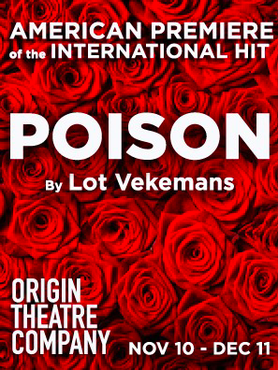
A truthful requiem
See it if
You're ready to watch two very fine actors work through pain, loss, and the truthful cathartic avowel of life, grief and change.
Don't see it if
You want simple entertainment; you've neither the patience nor desire to see a deep meditation on grief & acceptance, or existential dramas.
A great intense and very long silence permeates the opening of Lot Vekemans’ Poison, housed, appropriately enough, at the Beckett Theatre. The cold bare set — an offset white tiled marble floor, long white bench, and cold-drink vending machine — is, not unlike the play's characters, an island floating in a sea of black.
The audience enters as a man stands waiting and very still onstage. The quiet intensifies with the energy of anticipation, and the stillness and silence soar past the stage and into the auditorium like air in a cathedral.
This is only right as Poison is a requiem: for the spirit of the lost child; for the Woman's grief; for the relationship between the Man & the Woman that died with that death.
There's a bit of Beckett and of Pinter in Lot Vekemans' fine, deceptively simple script, which is filled with silence, long pauses, depth and the well observed details of everyday life, from the “click of the lock in the door” as He left her, to the pinwheels and chocolates He remembered She loved. At the same time, the slow reveal of exposition and history at times just thud in the air, each bit of information a check off the list of expectations.
Erwin Maas’s direction is lean and focused, allowing the wonderful Birgit Huppuch and Michael Laurence the space to so accurately portray the range of pain and anguish; the poison of Her grief, Her arias of grief, through to some version of acceptance of life. The realization that the present moment is all, that it just is, things just are; no better no worse, no right or wrong. And that can be enough, can be ok. It's a delicate line, a risky balancing act both actors pull off touchingly.
The literal arias, however, beautifully sung by young Jordan Rutte, Stauss's "Morgen!" ("Tomorrow!") — "And tomorrow the sun will shine again" — are problematic without translation and so seem oddly imposed on the realistic action onstage; it likely made more sense in Dutch.
Poison is not for everyone, an intense, slowly paced 90 minutes of totally naturalistic and transcendent acting and performance at times painful to watch, but very worth the experience.
 RSS Feed
RSS Feed